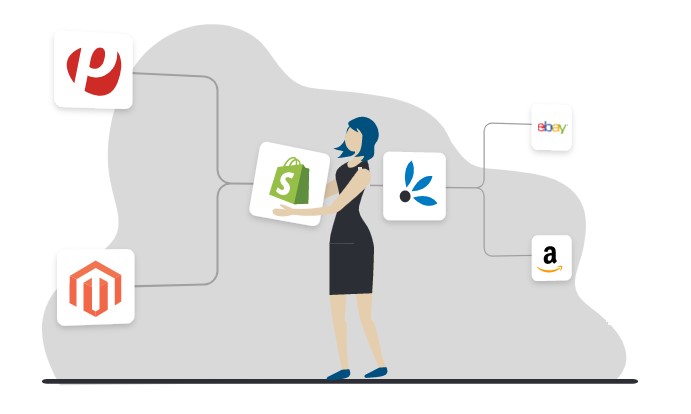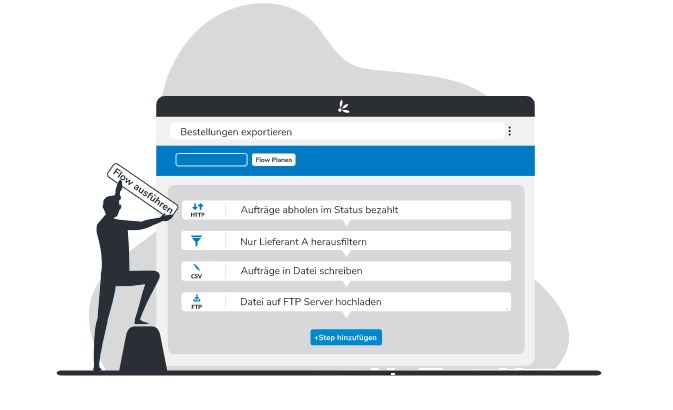Setting up a new online shop entails a lot of work. It quickly becomes complicated and expensive, especially when it comes to integrating other systems and their interfaces. If you opt to have your interfaces custom programmed, it involves additional costs. Perhaps this is why you are looking for an alternative?
Synesty offers you a no-code solution. Synesty is a software tool or middleware that facilitates data exchange. It is easy to use without extensive programming knowledge and comparatively affordable. Moreover, it is useful for various other applications. Synesty is also suitable for numerous shop systems, including Shopify and Shopware. In the following article, we will show you how Synesty works and how it helps you successfully provide data from your online shop or import data into it.
Once your own business is up and running, as a retailer or shop manager, you face the major challenge of managing data related to orders, stocks, and products flawlessly. Speed is a crucial success factor in today’s time. The past years have shown that companies with integrated systems and automated processes operate more efficiently and benefit from standardization and rapid adaptation to new business models.
Learn how you can automate your data management with Synesty and save valuable time in this article.
Shopify and Shopware are Popular E-Commerce Platforms
Shopify is a cloud-based commerce platform through which over 1.7 million merchants worldwide sell their products. Shopify is primarily known for its easy creation of cloud-based online shops. Additionally, the platform allows merchants to sell products on marketplaces such as Amazon or on social media networks. An alternative e-commerce system is provided by Shopware. Shopware is a German company and is also very popular. The majority of the available packages with Shopware (editions) are server-based, or on-premises.
When it comes to deciding which system is right for you, it’s more of a fundamental decision. With a cloud-based system like Shopify, you receive regular support from the provider with central updates. Server-based e-commerce systems like Shopware allow you to make more independent decisions and to have control over your system.
How Digitalization Continuously Challenges Business Models and Companies
Due to digitalization and the advancement of various technologies, companies are constantly faced with the requirement to perform faster and better. Thanks to large corporations, consumers in the B2C sector are accustomed to receiving their orders within a very short time, getting answers to their questions in customer service at any time, and being able to return items free of charge. In order to remain competitive in the fast-paced market, online retailers must meet these needs as best as possible. And this requires an internal infrastructure that keeps control over the sum of data between end customers and the company, as well as between the company and its suppliers. After all, you also don’t want to receive disappointed messages due to an overselling of the highly sought-after goods, right?
An infrastructure that nips this and many other problems in the bud due to scalable data management is only possible if processes are consistently digitally mapped. This can be facilitated by various applications, such as Product Information Management systems (PIM), Customer Relationship Management (CRM) systems, as well as reporting tools. However, it is important that data exchange between the various applications is enabled. It is recommended to strategically build the systems based on a central system (for example, an ERP system). Subsequently, interfaces to the various applications needed as an online retailer – such as your Shopify shop – are established.
What is a Shopify or Shopware Interface / API / Connector?
When we talk about interface technology, we often encounter various terminologies that ultimately convey something similar. Even in the context of Shopify, we hear not only about the Shopify interface but also about the Shopify API and the Shopify connector.
Although it may sound complex at first, it really isn’t. In essence, a Shopify API and interface are the same thing. API stands for Application Programming Interface. It is an interface that allows two independent software components to exchange information over the internet.
In the case of Shopify, this means that the Shopify interface / API enables communication between the commerce platform and third-party tools. For example, you can connect the online shop to the price comparison engine Idealo to transmit the necessary data and thus be present in this price comparison engine. In e-commerce, APIs are also used to keep track of inventory and provide customers with information about the availability of products. A connector, on the other hand, is the link between two systems or two interfaces.

What do Shopify or Shopware Interfaces Mean for Online Retailers?
To automate processes in data management around your Shopify or Shopware online shop, a Shopify or Shopware interface must be used. A comprehensive and cross-cutting interface concept enables online retailers to derive the following benefits, for example:
- Seamless and integrated processes up to customers
- Faster throughput times
- Reduction of error sources through automation and standardization
- Centralized master data, providing access to uniform address and article master data
- Increased utility of process status, movement data, and other information for employees, customers, and partners in real-time
Working with Synesty saves you time, money, and can positively influence your search engine optimization.
You can test the features with a certain number of data sets for an unlimited time for free. Simply create an account here. Are you already convinced? Then compare the packages of Synesty now.
Direct Integration of Shopify and Shopware with Fulfillment Service Providers and ERP
Direct Integration of Shopify and Shopware with Fulfillment Service Providers and ERP
To track, prioritize, and ultimately fulfill orders faster, you want to connect your Shopify or Shopware online shop directly to potential fulfillment service providers as well as your ERP. What may sound highly complex at first is easily achievable with the right middleware, and all without a large budget or existing programming knowledge.
Synesty is the cloud middleware that enables interfaces, data exchange, and automated processes in your company without programming. Applications can be connected via drag & drop. Products and orders from your Shopify or Shopware shop are then automatically imported or exported. Manual status changes or transmission of shipping data are a thing of the past.
Synesty offers a specific interface for Shopify and Shopware to manage products and orders. As an e-commerce retailer, this offers you the following benefits:
- Payment flows are processed automatically
- Order data is retrieved and imported automatically
- Inventory levels and packing lists are always up-to-date
- Product data and orders are synchronized between the shop and suppliers
- Data feed optimization for better ranking
- Price adjustments are centrally managed
- Product images and metafields are automatically retrieved and imported
- Communication with customers is error-free and fast
One of the greatest benefits resulting from automation is the gain of important resources such as time and money. By automating more and more processes and data transfers, you as a retailer have more time to focus on your core business and scaling the company.

What is the Advantage of the Synesty Interface Compared to Free Interfaces from Other Systems?
There are already various systems on the market that offer free Shopify plug-ins. However, these are typically tailored to specific applications, and many of these plug-ins are very restrictive, with many steps being fixed. Since each online shop is individual, Synesty’s middleware can be adapted to meet specific needs.
Additionally, installed Shopify apps can negatively impact your shop’s performance. The extended code can slow down the page speed of your website, affecting your position in search engine results.
With Synesty, you can consolidate all your automated processes into one system without affecting your shop’s performance. Building an individual infrastructure for exchanging data between various connections can quickly become costly, especially when developers are involved. Synesty, on the other hand, provides you with a toolkit that allows for the individual connection of a variety of systems without programming knowledge.
You can adopt prefabricated flows or create your own processes based on your needs, customize them, and expand them at any time, all without requiring a large sum of money for developers. Such middleware enables SMEs to successfully manage data for greater success in e-commerce.
Your Online Shop or E-Commerce Agency from Thuringia
Are you looking for an advertising agency that specializes in e-commerce and takes care of all your online marketing needs? From SEA to social media management, newsletters, price comparison portals like Google Shopping, and much more – we are your partners in online marketing. Get in touch with us! We look forward to hearing from you.





